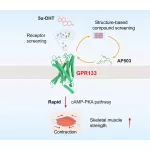Los Angeles, February 5, 2025 — A new study presented at the American Stroke Association’s International Stroke Conference 2025 suggests that individuals with shorter telomeres—protective caps at the end of chromosomes—may be at an increased risk for stroke, dementia, and late-life depression. These findings, derived from a large-scale UK Biobank analysis, provide insight into how biological aging impacts brain health.
Telomere Length and Brain Health
Leukocyte telomere length (LTL), a marker of biological aging, shortens with time, reducing its ability to protect genetic material. This process has been linked to increased vulnerability to age-related diseases. While genetic factors influence telomere length, lifestyle choices and environmental factors, such as pollution and stress, also play a role.
Dr. Tamara N. Kimball, a postdoctoral research fellow at Massachusetts General Hospital’s Henry and Allison McCance Center for Brain Health, emphasized the novelty of this study:
“No studies have previously examined the impact of leukocyte telomere length on a combined outcome of stroke, dementia, and late-life depression. All three conditions are linked to cerebral small vessel disease, a factor associated with aging and vascular risk.”
Study Findings
Researchers analyzed data from over 356,000 participants in the UK Biobank, who provided blood samples between 2006 and 2010 to assess LTL. The study tracked these participants for a median of 12 years to monitor the onset of stroke, dementia, or late-life depression. Key findings include:
- Individuals with the shortest LTL had an 8% higher risk of stroke, 19% higher risk of dementia, and 14% higher risk of late-life depression compared to those with the longest LTL.
- Overall, those with the shortest LTL had an 11% increased risk of developing at least one of these conditions.
- Among individuals with poor lifestyle and health habits (low Brain Care Score), shorter LTL significantly raised disease risk.
- Conversely, those with healthier lifestyles (high Brain Care Score) did not show an increased risk despite having shorter LTL.
Clinical Implications and Future Research
The study suggests that LTL could serve as a biomarker for identifying individuals at higher risk of age-related brain diseases, potentially guiding early interventions. However, Dr. Kimball cautioned against routine clinical testing of LTL:
“Although LTL may indicate biological aging, our study found no evidence that it directly causes stroke, dementia, or late-life depression. It is more of a reflection of underlying biological stress.”
Rather than focusing on interventions to alter telomere length, researchers advocate for a holistic approach emphasizing modifiable risk factors like healthy lifestyle choices. Further studies are needed to explore how LTL interacts with other risk factors over time.
Limitations and Expert Perspectives
The study focused on individuals of European ancestry, limiting its generalizability. Additionally, LTL and Brain Care Score were measured only at baseline, preventing analysis of changes over time.
Dr. Costantino Iadecola of Weill Cornell Medicine, who was not involved in the study, highlighted the significance of these findings:
“While aging is a well-known risk factor for stroke, dementia, and depression, this study suggests that telomere shortening in white blood cells can serve as a marker of aging’s impact on brain health.”
Conclusion
This research underscores the importance of aging-related biomarkers in predicting health outcomes. While telomere shortening does not directly cause brain diseases, its association with these conditions reinforces the need for proactive brain health management through lifestyle choices.
Disclaimer:
This article is based on preliminary research findings presented at the American Stroke Association’s International Stroke Conference 2025. The results should be interpreted with caution until further validated by peer-reviewed studies. This information is not intended to replace professional medical advice, diagnosis, or treatment. Always consult a healthcare provider for medical concerns.











